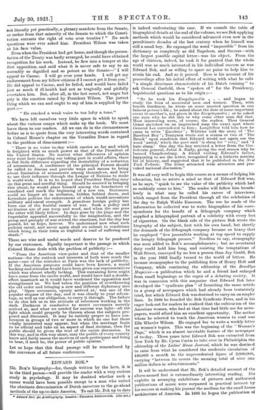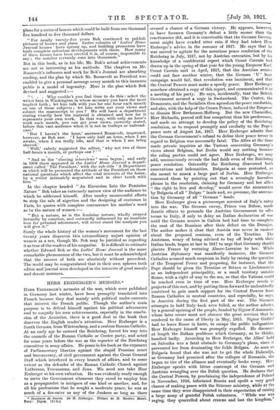EDWARD BOK.*
MIL Box's biography—for, though written by the hero, it is in the third person—will provide the reader with a very curious study in psychology. It may be doubted whether such a career would have been possible except to a man who united the obstinate determination of Dutch ancestors to the go-ahead methods of the up-to-date America. To call Mr. Bok up to date Bitumad Bak.: An dutobiograyhy. London Thornton gotterworth. 121s. net.'
is indeed understating the case. If we consult the table of biographical details at the end of the volume, we see Bok applying methods which would be considered advanced even now in the penultimate decades of the last century when he himself was still a small boy. He expunged the word "impossible" from his dictionary as completely as did Napoleon, and Success—with the largest possible capital letter—was his object. From the age of thirteen, indeed, he took it for granted that the whole world was as much interested in his individual success as was Edward Bok, and as willing to spare no pains to help him to attain his end. And so it proved. Here is his account of his proceedings after his initial effort of writing with what he calls "a simple directness characteristic of his Dutch training" to ask General Garfield, then "spoken of" for the Presidency, inquisitorial questions as to his origin :—
" So he took his Encyclopaedia . . . and began to study the lives of successful men and women. Then, with boyish frankness, lie wrote on some mooted question in one famous person's life ; he asked about the date of some important event in another's, not given in the Encyclopaedia ; or lie asked one man why he did this or why some other man did that. Most interesting were, of course, the replies. Thus General Grant sketched on an improvised map the exact spot where General Lee surrendered to him Longfellow told him how lie came to write ' Excelsior ' ; Whittier told the story of ' Tho Barefoot Boy ' ; Tennyson wrote out a stanza or two of 'The Brook' upon condition that Edward would not again use the word 'awful,' which the poet said 'is slang for "very," and 'I hate slang.' One day the boy received a letter from the Con- federate general, Juba! A. Early, giving the real reason why he burned Chambersburg. A *friend visiting. Edward's father, happening to see the letter, recognized in it a hitherto missing bit of history, and suggested that it be published in the New York Tribune. The letter attracted wide attention and pro- voked national discussion."
It was all very well to begin this course as a means of helping his education, but so astute a mind as that of Edward Bok was,
as he says, "quick to see the value of the publicity which had so suddenly come to him." The reader will follow him breath- lessly in what may be called his career of interviews, which ranged from the President through all the celebrities of the day to Ralph Waldo Emerson. The use he made of the
information he collected was to write biographies of his corre- spondents for the benefit of a lithograph company which
supplied a lithographed portrait of a celebrity with every box of cigarettes. On the blank side of the picture Bok wrote the biography of the subject, first with his own hand, but shortly the demands of the lithograph company became so heavy that he employed "five journalists working at top speed to supply the hungry lithograph presses." Needless to say, stenography
was soon added to Bok's accomplishments ; but no secretarial duty could hold him long, and resisting the temptations of Wall Street, conveyed by no less a person than Jay Gould, Bok in the year 1882 finally turned to the world of letters. Ho became stenographer to the publishing firm of Henry Holt and Company, while continuing the editorship of the Brooklyn Magazine—a publication which he and a friend had enlarged from small beginnings as the organ of a debating society. It was in connexion with this magazine that Edward Bok later developed the "syndicate plan" of furnishing the same article to a group of newspapers which had already been tentatively tried, but which Edward Bok was destined to carry on on ampler lines. In 1886 he founded the Bok Syndicate Press, and in his eager look-out for readers he realized that the cultivation of the American woman, who had at that time had little Use for news- papers, would afford him an excellent opportunity. The author whom he selected to teach the American women to read was
Ella Wheeler Wilcox. He engaged her to write a weekly letter on women's topics. This was the beginning of the "Woman's Page," which is an almost inevitable feature of the newspaper of to-day. Three years later Edward Bok was extracted from New York by Mr. Cyrus Curtis to take over in Philadelphia the
editorship of the Ladies' Home Journal, which he was destined
to raise from what he considered the moderate circulation of 440,000 a month to the unprecedented figure of 2,000,000, carrying "between its covers the amazing total of over ono million dollars in advertisements."
It will be understood that Mr. Bok's detailed account of the above-named feat is extraordinarily interesting reading. His exploits in arranging exhibitions of pictures and authorized publications of music were surpassed in practical interest by his success in making his journal the medium for the small house architecture of America. In 1895 he began the publication of
plans for a series of houses which could be built from one thousand five hundred to five thousand dollars.
"For nearly twenty-five years Bok continued to publish pictures of houses and plans. Entire colonies of Ladies' Home Journal houses' have sprung up, and building promoters have built complete suburban developments with them. How many of these homes have been erected it is, of course, impossible to say ; the number certainly runs into thousands."
But in this book, as in his life, Mr. Bok's actual achievements are not so interesting as his methods. The chapters on Mr. Roosevelt's influence and work for Bolt's Journal are absorbing reading, and the plan by which Mr. Roosevelt as President was enabled to give a personal message every month to this immense public is a model of ingenuity. Here is the plan which Bok devised and suggested ‘• • • Why couldn't you find time to do this : select the writer here in Washington in whose accuracy you have the most implicit faith ; let him talk with you for one hour each month on one of those subjects ; let him write out your views and submit the manuscript to you ? We will have a department stating exactly how tho material is obtained and how far it represents your own work. In that way, with only an hour's work each month, you can get your views, correctly stated, before this vast audience when it is not in trolleys or railroad- ears.'
But I haven't the hour,' answered Roosevelt, impressed, however, as Bok saw. 'I have only half an hour, when I am awake, when I am really idle, and that is when I fun being shaved.'
Well,' calmly suggested the editor, why not two of those half-hours a month, or perhaps one ? ' " . .
"And so the shaving interviews' were begun ; and early in 1906 there appeared in the Ladies' Home Journal a depart- ment called The President,' with the sub-title • A Department in which will be presented the attitude of the President on those national questions which affect the vital interests of the home, by a writer intimately acquainted and in close touch with him.
In the chapter headed "An Excursion Into the Feminine Nature" Bok takes an extremely narrow view of the audience to which he addressed himself. After sundry unsuccessful efforts to stop the sale of aigrettes and the designing of costumes in Paris, he quotes with complete concurrence his mother's word as to the nature of women :— " But a nature, as is the feminine nature, wholly swayed inwardly by emotion, and outwardly influenced by an insatiate love for personal adornment, will never stand the analysis you will give it."
Surely the whole history of the woman's movement for the last twenty years disproves this extraordinary unjust opinion of women as a sex, though Mr. Bolt may be justified as regarding it as true of the readers of his magazine. It is difficult to estimate whether Edward Bok or the Ladies' Home Journal is the more remarkable phenomenon of the two, but it must be acknowledged that tho success of both are absolutely without precedent. The world may be congratulated that in their own spheres both editor and journal were developed in the interests of good morals and decent manners.



































 Previous page
Previous page